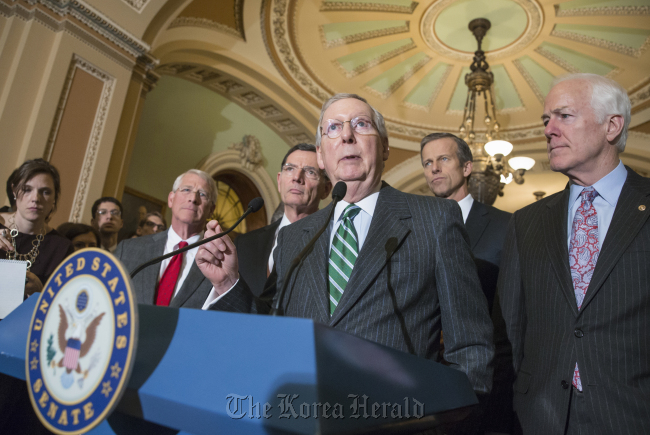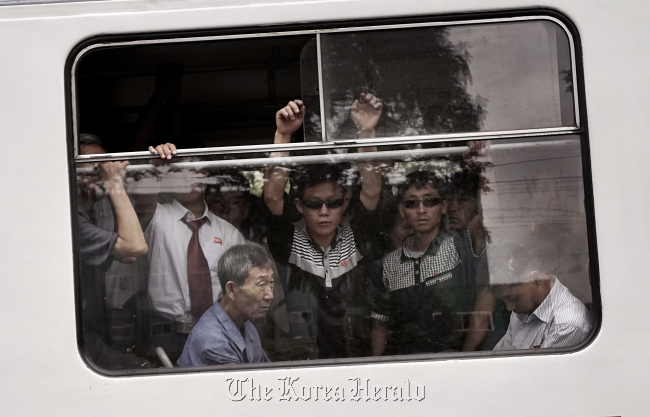The U.S. on Thursday put in place a package of its strongest, most comprehensive standalone sanctions yet against North Korea over its fresh nuclear and long-range missile tests, also targeting cybercrimes, human rights violations and other illicit activities.
President Barack Obama signed the “North Korea Sanctions and Policy Enhancement Act” into law, the White House said. The House of Representatives initially voted nearly unanimously to pass the bill about a week after the Jan. 6 underground blast and gave final approval on Feb. 12 following slight changes in line with the Senate’s endorsement.
The legislation, H.R. 757, is designed to make way for the administration to tighten sanctions on individuals and entities engaging in transactions related to Pyongyang’s nuclear and missile programs, cyberattacks, arms, narcotics and cash smuggling, human rights breaches, luxury goods buys, misuse of the global financial system and other illegitimate acts.
“The Congress seeks, through this legislation, to use nonmilitary means to address this crisis, to provide diplomatic leverage to negotiate necessary changes in North Korea’s conduct and to ease the suffering of the people of North Korea,” the text reads.
 |
| Senate Majority Leader Mitch McConnell (third from right) speaks to reporters on Capitol Hill in Washington on Feb. 9 following a closed-door policy meeting, saying the chamber will consider legislation to hit North Korea with more stringent sanctions in the wake of its recent missile launch.(AP-Yonhap) |
Seoul welcomed its ratification, saying it attests to Washington’s concrete resolve to take stern action against the latest provocations and will help reinforce the international community’s united response.
“As the world’s first systematic, standalone North Korea sanctions law built on bipartisan support, the legislation is expected to provide the foundation for the U.S. administration to take strong, effective steps,” Foreign Ministry spokesman Cho June-hyuck said at a news conference Friday.
“Our government, together with the international community, will take all possible measures to make North Korea abandon nuclear weapons and change itself.”
The bill was introduced by Rep. Ed Royce, chairman of the House foreign affairs committee, in February 2015 in the wake of the North’s computer network hack of Sony Pictures, but had not been put up for a vote since.
Focusing chiefly on ways to deny the Kim Jong-un regime access to funds for its military programs, the act mandates that Obama brief the panel no later than 180 days after its effectuation and regularly afterward on the communist state’s principal foreign assets and sources of foreign income, and also provide a list of designated persons for their contribution to the proliferation of weapons of mass destruction, arms and luxury goods trade, censorship and other “prohibited conducts,” as well as a summary of diplomatic efforts to sanction and block the assets of banned North Korean banks.
 |
| In this Sept. 11, 2015 photo, commuters ride on a crowded city trolley bus in Pyongyang. (AP-Yonhap) |
Citing the dismal living conditions in the reclusive country, it also called on the secretary of state to provide “specific findings with respect to the responsibility for serious human rights abuses and censorship” of Kim and other top military and ruling Workers’ Party officials.
The goal of the sanctions is to “serve to increase pressure,” White House Press Secretary Josh Earnest said one day before the signing, adding that the administration is “deeply concerned” about North Korea’s recent actions and provocations.
“That’s a goal that Congress stated, and it’s a goal that we share,” he said at a news briefing.
The measures came as the U.S. and China are struggling to narrow the differences in their stances over the forthcoming U.N. Security Council sanctions. While Seoul calls for a “terminating resolution” and the U.S. seeks much stricter bans, such as those directed at Pyongyang’s banking and finance, China remains reluctant, apparently wary of a possible breakdown of the North Korean economy.
The sanctions discussions have unprecedentedly been drawn out for more than 40 days. The UNSC took 18 and 23 days before unveiling the final texts following the North’s second and third tests in 2009 and 2013, respectively.
By Shin Hyon-hee (heeshin@heraldcorp.com)

